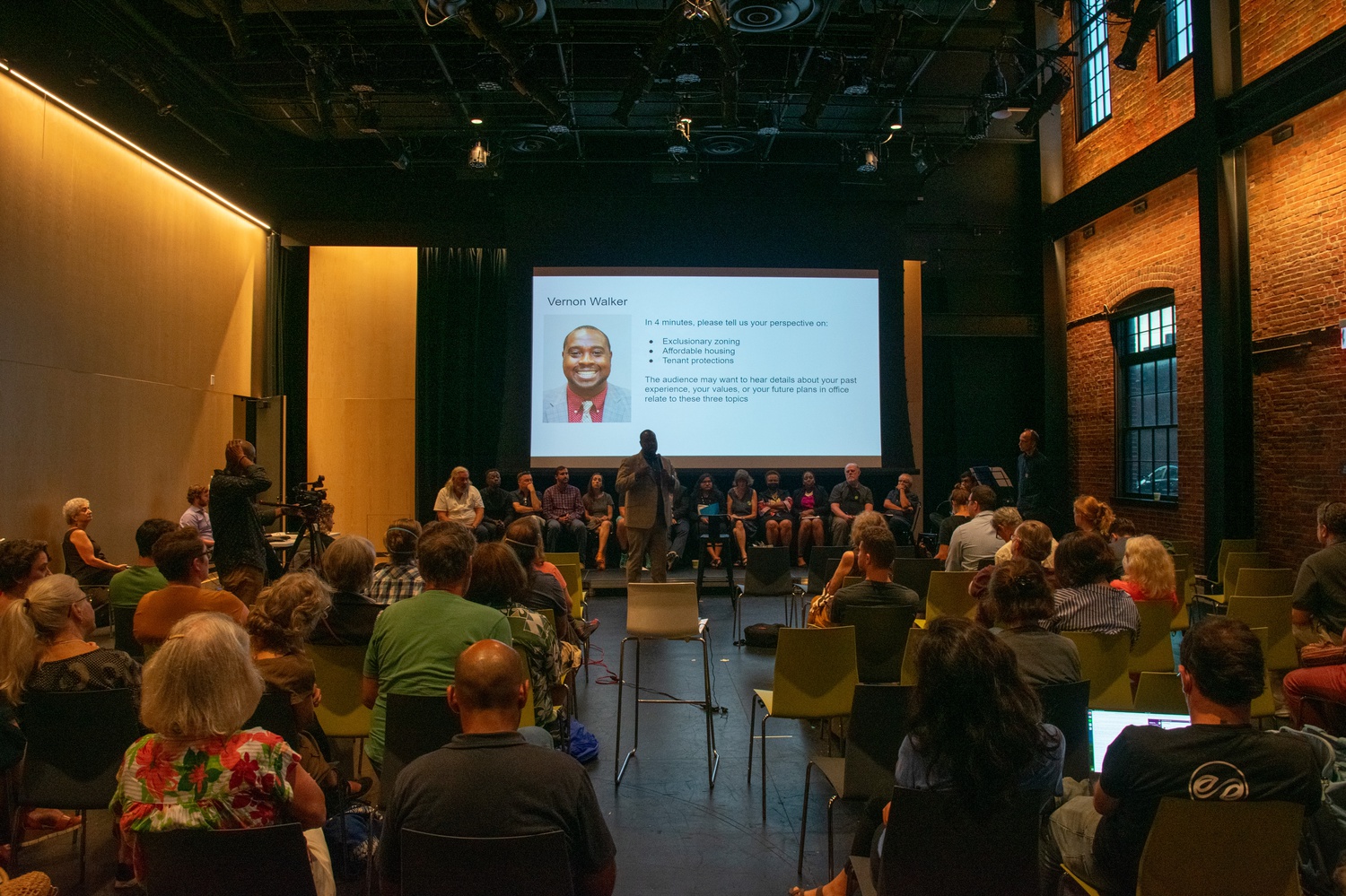
News
Summers Will Not Finish Semester of Teaching as Harvard Investigates Epstein Ties

News
Harvard College Students Report Favoring Divestment from Israel in HUA Survey

News
‘He Should Resign’: Harvard Undergrads Take Hard Line Against Summers Over Epstein Scandal

News
Harvard To Launch New Investigation Into Epstein’s Ties to Summers, Other University Affiliates

News
Harvard Students To Vote on Divestment From Israel in Inaugural HUA Election Survey
Cambridge City Council Hopefuls Talk Affordable Housing at Second Candidate Forum

Exclusionary zoning, affordable housing, and tenant protections took center stage at this week’s second Cambridge City Council candidate forum Tuesday night at the Foundry in Kendall Square.
Organized by the nonprofit A Better Cambridge and moderated by Bill Boehm, the forum gave the 16 attending candidates a platform to discuss housing issues in Cambridge. Each received four minutes to speak about their housing proposals, with another two minutes allotted to follow-up questions from Boehm. A Better Cambridge co-chair Dan Phillips delivered an introduction.
While candidates mostly supported increasing affordable housing, the group was split on support for the Affordable Housing Zoning Overlay.
Passed in October 2020, the AHO makes it cheaper and easier for developers to build affordable housing in areas whose zoning might otherwise prevent high-density construction. The Council is considering a controversial amendment that would expand the AHO’s impact, including allowing 15-story buildings in some of the city’s squares and corridors.

Councilors E. Denise Simmons, Marc C. McGovern, and former Councilor Jivan G. Sobrinho-Wheeler — sponsors of the original ordinance — defended the AHO and its amendments.
“Everybody says that they support affordable housing,” McGovern said. “The question you gotta ask is, how far are you willing to go?”
Former Council aides Daniel J. Totten and Adrienne Klein joined McGovern in their support for the AHO.
“I’m not afraid of height, I’m not afraid of density, I just want to make sure that low and middle-income people can benefit from that height and density,” Totten said.
Some challengers opposed the AHO. Robert Winters, who has served on the Envision Cambridge Advisory Committee and Housing Working Group, said that he opposed the AHO “when it was first introduced” and does not support the proposed amendments.
Councilor Patricia M. “Patty” Nolan ’80, who joined via Zoom, said the AHO has “barely had any success” but pushed back against characterizations that she is “anti-housing.”
“I believe there’s a room and place for nuance,” she said, adding that she would vote in support of the AHO amendments if there could be a “more nuanced” approach with requirements for middle-income families.

Many candidates also voiced support for bringing back rent stabilization, which was banned across Massachusetts in 1994.
“I think that would be really exciting,” said Councilor Burhan Azeem, noting that Massachusetts State Rep. Mike L. Connolly has filed a ballot petition to allow cities and towns to impose rent control.
Nolan and Totten proposed encouraging universities to provide housing for their graduate students and relieve pressure on the city’s housing market, an idea that received unanimous support at the last forum on Sunday.
Harvard Medical School instructor Peter Hsu, meanwhile, argued that Lesley University could provide land while Harvard and MIT provide money to build new affordable housing.
“We have to partner with our universities,” said Mayor Sumbul Siddiqui.
Siddiqui and others also supported rolling back exclusionary zoning restrictions.
“We talk so much about being an inclusive and welcoming city, but we don’t actually look at our restrictive zoning — we’re complicit in perpetuating our outdated zoning system,” she said.
First-time candidate Vernon K. Walker concurred.
“I am a supporter of eliminating and ending exclusionary zoning because we know that Black and brown folks are hurt the most,” he said.
Across the board, candidates acknowledged the complexity of the issue at hand.
“There’s no single magic bullet that’s gonna fix affordable housing,” Sobrinho-Wheeler said. “And there’s so much we can do.”
Correction: September 13, 2023
A previous version of this article incorrectly stated that the forum was moderated by Dan Phillips. In fact, the forum was moderated by Bill Boehm, while Phillips gave an introduction.
—Staff writer Julian J. Giordano can be reached at julian.giordano@thecrimson.com. Follow him on X @jjgiordano1.
—Staff writer Samuel P. Goldston can be reached at samuel.goldston@thecrimson.com.
Want to keep up with breaking news? Subscribe to our email newsletter.
